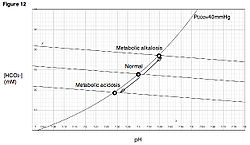Metabolic alkalosis

Editor-In-Chief: Prab R Tumpati, MD
Obesity, Sleep & Internal medicine
Founder, WikiMD Wellnesspedia &
W8MD's medical weight loss NYC, sleep center NYC
Philadelphia medical weight loss and Philadelphia sleep clinics
| Metabolic alkalosis | |
|---|---|

| |
| Synonyms | N/A |
| Pronounce | N/A |
| Specialty | N/A |
| Symptoms | Confusion, muscle twitching, nausea, vomiting, hand tremor |
| Complications | Seizures, arrhythmias, coma |
| Onset | Sudden or gradual |
| Duration | Variable |
| Types | N/A |
| Causes | Vomiting, diuretic use, hypokalemia, antacid overuse |
| Risks | Chronic kidney disease, heart failure, liver cirrhosis |
| Diagnosis | Arterial blood gas analysis, serum electrolyte levels |
| Differential diagnosis | Respiratory alkalosis, metabolic acidosis |
| Prevention | Address underlying causes, monitor electrolyte levels |
| Treatment | Intravenous fluids, potassium supplementation, treat underlying cause |
| Medication | N/A |
| Prognosis | Good with treatment |
| Frequency | Common |
| Deaths | N/A |

Metabolic alkalosis is a metabolic disorder that occurs when the pH of the blood is elevated beyond the normal range. This can be due to a decrease in the concentration of hydrogen ions in the blood or an increase in the concentration of bicarbonate ions.
Causes[edit]
Metabolic alkalosis can be caused by a variety of factors, including:
- Excessive loss of acid from the body, such as through vomiting or diarrhea
- Consumption of certain medications, such as diuretics or antacids
- Certain medical conditions, such as Cushing's syndrome or Bartter syndrome
- Overuse of bicarbonate-containing substances, such as baking soda
Symptoms[edit]
The symptoms of metabolic alkalosis can vary depending on the severity of the condition. They may include:
Diagnosis[edit]
Metabolic alkalosis is typically diagnosed through a blood test that measures the pH and bicarbonate levels in the blood. Other tests may be performed to determine the underlying cause of the condition.
Treatment[edit]
The treatment for metabolic alkalosis depends on the underlying cause. This may involve:
- Stopping the use of certain medications
- Treating the underlying medical condition
- Replacing lost fluids and electrolytes
See also[edit]
|
|
|
Ad. Transform your life with W8MD's Budget GLP-1 injections from $75


W8MD offers a medical weight loss program to lose weight in Philadelphia. Our physician-supervised medical weight loss provides:
- Weight loss injections in NYC (generic and brand names):
- Zepbound / Mounjaro, Wegovy / Ozempic, Saxenda
- Most insurances accepted or discounted self-pay rates. We will obtain insurance prior authorizations if needed.
- Generic GLP1 weight loss injections from $75 for the starting dose.
- Also offer prescription weight loss medications including Phentermine, Qsymia, Diethylpropion, Contrave etc.
NYC weight loss doctor appointmentsNYC weight loss doctor appointments
Start your NYC weight loss journey today at our NYC medical weight loss and Philadelphia medical weight loss clinics.
- Call 718-946-5500 to lose weight in NYC or for medical weight loss in Philadelphia 215-676-2334.
- Tags:NYC medical weight loss, Philadelphia lose weight Zepbound NYC, Budget GLP1 weight loss injections, Wegovy Philadelphia, Wegovy NYC, Philadelphia medical weight loss, Brookly weight loss and Wegovy NYC
|
WikiMD's Wellness Encyclopedia |
| Let Food Be Thy Medicine Medicine Thy Food - Hippocrates |
Medical Disclaimer: WikiMD is not a substitute for professional medical advice. The information on WikiMD is provided as an information resource only, may be incorrect, outdated or misleading, and is not to be used or relied on for any diagnostic or treatment purposes. Please consult your health care provider before making any healthcare decisions or for guidance about a specific medical condition. WikiMD expressly disclaims responsibility, and shall have no liability, for any damages, loss, injury, or liability whatsoever suffered as a result of your reliance on the information contained in this site. By visiting this site you agree to the foregoing terms and conditions, which may from time to time be changed or supplemented by WikiMD. If you do not agree to the foregoing terms and conditions, you should not enter or use this site. See full disclaimer.
Credits:Most images are courtesy of Wikimedia commons, and templates, categories Wikipedia, licensed under CC BY SA or similar.
Translate this page: - East Asian
中文,
日本,
한국어,
South Asian
हिन्दी,
தமிழ்,
తెలుగు,
Urdu,
ಕನ್ನಡ,
Southeast Asian
Indonesian,
Vietnamese,
Thai,
မြန်မာဘာသာ,
বাংলা
European
español,
Deutsch,
français,
Greek,
português do Brasil,
polski,
română,
русский,
Nederlands,
norsk,
svenska,
suomi,
Italian
Middle Eastern & African
عربى,
Turkish,
Persian,
Hebrew,
Afrikaans,
isiZulu,
Kiswahili,
Other
Bulgarian,
Hungarian,
Czech,
Swedish,
മലയാളം,
मराठी,
ਪੰਜਾਬੀ,
ગુજરાતી,
Portuguese,
Ukrainian

